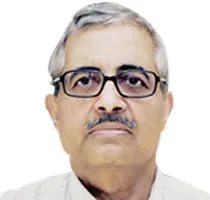-
CENTRES
Progammes & Centres
Location
 PDF Download
PDF Download 
The Russia-India-China (RIC) grouping is the only body that brings together the three largest Asian countries at a time when there is a churning in the existing security Tarchitecture in the region. But, RIC seems to have lost steam amidst the alphabet soup of multilaterals in which the three countries are engaged, despite some efforts lately to rejuvenate the forum.
Together, Russia, India and China occupy around 50 percent of Asia's landmass. The three countries constitute some of the largest economies in Asia. They certainly also have the largest political stakes in the region. There are a lot of potential synergies among the three countries, making a compelling case for their collaboration. Therefore, it is natural that they should have a significant say in the emerging governance architecture in their neighbourhood and be an influential voice on issues of global governance.
Given the commonality of strategic goals, the RIC forum appears to be an appropriate platform that should now identify a unique roster of issues, which would differentiate it from other multilateral organisations, like BRICS and SCO, as well as allow the three powers to specify common objectives in the region and at global forums.
The first task would be to flag important issues in which the forum should engage. This exercise needs to be ambitious as well as steeped in a degree of realism. Congruent interests must also be accommodated in this effort. The three countries need to spell out some of the nuanced yet converging positions on key issues. Keeping these twin objectives in mind, some of the potential areas of engagement at the RIC forum may include:
Afghanistan is an area of interest for the three countries. Moscow, Delhi and Beijing want Afghanistan to be stable and each of them has a significant stake in ensuring that Afghanistan is not a refuge for terrorism or a haven for terrorist organisations. This can build on previous discussions held among the three National Security Advisors trilaterally and among other officials bilaterally. The three could work on projects for the economic development of Afghanistan and integrating the country into the regional economic mainstream, making it a subset of the SAARC effort to create a common South Asian market. Afghanistan can potentially become the geographic trade bridge between South Asia and Central Asia. Towards this end, it would help if Russia is brought into SAARC as an observer. This may have the added benefit of providing a certain equilibrium to the RIC platform.
There are some global issues on which prima facie the three countries should have similar positions. India, Russia, and China could pursue a dialogue on counter-terrorism issues—starting with the exchange of information. Moreover, the forum could discuss cyber-security and develop a common understanding on cyber-governance. This is important given the growing online populations as well as the rise of digital commerce in all three countries; much of the discourse on management of cyber-space currently emanates from the West. It is important that RIC maintains the distinction between cyber-governance and cyber-security.
RIC can take up strategic issues, including the emerging security architecture, the situation in West Asia and Central Asia. At the multilateral level, they could discuss coordinating positions within the BRICS and SCO. India should lobby within RIC to promote reforms in the United Nations, including the Security Council, and specifically get RIC to endorse India's candidature for the Security Council. The three countries should also work towards a consensus on pushing reforms in institutions of global governance.
There are sufficient synergies between Russia, India and China in Central Asia to justify deep cooperation. The three countries have ongoing bilateral dialogues on Central Asia. They could expand this engagement by also having a trilateral dialogue on the region. RIC must work towards thwarting the rise of Islamic extremism, providing political stability in the region and extending such stability to Afghanistan. The Indian subcontinent could be connected with Russia and Central Asia by developing transportation and telecommunications links via China.
RIC could develop a roadmap for joint collaboration projects in the Russian Far East, which Moscow is keen on developing. India and China could pitch in with their respective skill and labour competencies as well as investments.
RIC countries can cooperate in non-traditional areas such as disaster management, human trafficking, and drug trafficking by developing joint guidelines on these issues. They could also enhance their cooperation in counter-piracy and humanitarian relief in the Indian Ocean.
The nuclear non-proliferation regime is witnessing dramatic changes with the temporary deal and talks between the West and Iran. RIC needs to engage with this emerging global nuclear order. Additionally, RIC countries could look at means to enhance civil nuclear cooperation among themselves. India and Russia are already partners and China has long to mid-term plans to enter this space commercially. This would offer India and China the chance to further their claim to play a strategic role in shaping the new nuclear order. It could buttress India's entry into the four nuclear export control regimes, i.e. the Australia Group, Wassenaar Arrangement, Missile Technology Control Regime (MTCR) and the Nuclear Suppliers Group.
The three countries should discuss energy security in Asia as they form the core of much of the energy supply and demand of the world. India and China are two of the largest importers of energy and Russia is one of the largest exporters of energy. According to IEA estimates, by 2030, China is projected to consume 200 bcm of gas while India is projected to consume 116 bcm. At the same time, Russia's gas production is expected to reach 727 bcm while Central Asia is expected to produce around 323 bcm. The three countries could discuss the creation of an Asian energy grid. This would go a long way in ensuring energy security for the region as well as allow these countries to determine prices suitable to them.
Russia, India and China can broaden joint research, cooperation and exchanges in education, agriculture, healthcare and science. They could also work towards a common understanding on global governance issues like maritime spaces and outer space.
RIC could also discuss a multilateral currency swap arrangement on the lines of the Chiang Mai initiative. They could discuss the possibility of the establishment of a framework for enhanced cooperation among Chambers of Commerce of the three countries and improvement of the exchange of information on commercial opportunities and specific trading conditions in order to boost trade and investment. The RIC should discuss ways and means of promoting bilateral trade—using the trilateral to strengthen bilateral trade ties. Joint projects, for example, in aerospace should also be on the agenda.
The Indo-Russia relationship is one with hardly any differences at the political level. India and Russia should leverage this special relationship in order to deepen China's integration into the RIC format.
To conclude, RIC stands at a historic moment when it can further Asian integration at a time when the region is seeking to redefine itself. RIC can also significantly influence the development of the new rules of global engagement. This moment must not be lost. To this end, the following specific suggestions may help give the RIC forum greater relevance in the near future:
The views expressed above belong to the author(s). ORF research and analyses now available on Telegram! Click here to access our curated content — blogs, longforms and interviews.

Nandan Unnikrishnan is a Distinguished Fellow at Observer Research Foundation New Delhi. He joined ORF in 2004. He looks after the Eurasia Programme of Studies. ...
Read More +
Samir Saran is the President of the Observer Research Foundation (ORF), India’s premier think tank, headquartered in New Delhi with affiliates in North America and ...
Read More +
Dr Uma Purushothaman teaches International Relations at the Central University of Kerala. She was earlier associated with Observer Research Foundation. Her areas of interest include ...
Read More +